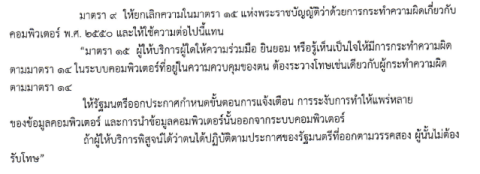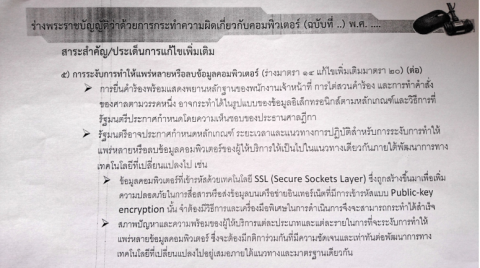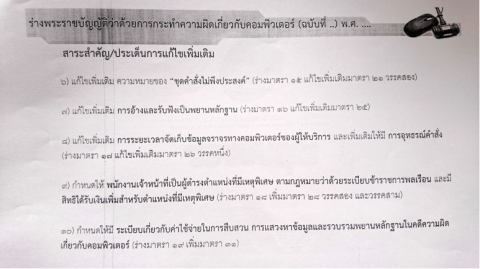Le roi est mort…
October 14, 2016


JUST SAY KNOW!
July 29, 2016


Internet slow for you, too? Thai Netizen leaks docs showing compromise of secure transactions
May 28, 2016
[FACT comments: Readers should be aware that Thailand’s MICT is continuing its plan to consolidate the current ten international Internet gateways (IIG) into a single gateway to facilitate monitoring and censorship.
Even worse, the official Thai government documents leaked by TNN show that MICT is implementing plans to compromise encrypted SSL Internet transactions to pursue Thailand’s Great Firewall strategy.
If this still does not worry the ordinary person who relies on the Internet every single day, SSL is what makes online banking secure, among many other sorts of Internet transactions and all online commerce possible.
Put away that credit card!]
“Single Gateway” คืนชีพ ก.ไอซีทีเสนอในพ.ร.บ.คอมพ์ ให้มีวิธีระงับข้อมูลที่เข้ารหัส SSL
Thai Netizen Network: May 26, 2016
https://thainetizen.org/2016/05/single-gateway-back-ssl-censorship/
พบเอกสารนำเสนอที่มีชื่อ “กระทรวงเทคโนโลยีสารสนเทศและการสื่อสาร” เสนอหลักการและเหตุผลแก้ไขมาตรา 20 ของพ.ร.บ.คอมพิวเตอร์ให้รัฐมนตรีสามารถออกประกาศกำหนดให้มีวิธีการในการปิดกั้นข้อมูลที่ถูกเข้ารหัสได้
ในหน้า 7 ของเอกสารนำเสนอดังกล่าว ระบุว่า “รัฐมนตรีอาจประกาศกำหนดหลักเกณฑ์ ระยะเวลาและแนวทางการปฏิบัติสำหรับการระงับการทำให้แพร่หลายหรือลบข้อมูลคอมพิวเตอร์ของผู้ให้บริการให้เป็นไปในแนวทางเดียวกันภายใต้พัฒนาการทางเทคโนโลยีที่เปลี่ยนไป เช่น ข้อมูลคอมพิวเตอร์ที่เข้ารหัสด้วยเทคโนโลยี SSL (Secure Socket Layer) ซึ่งถูกสร้างขึ้นมาเพื่อเพิ่มความปลอดภัยในการสื่อสารหรือส่งข้อมูลบนเครือข่ายอินเทอร์เน็ตที่มีการเข้ารหัสแบบ Public-key encryption นั้น จำเป็นต้องมีวิธีการและเครื่องมือพิเศษในการดำเนินการจึงจะสามารถกระทำได้สำเร็จ …”

หน้า 7 ของเอกสารนำเสนอกล่าวถึงการระงับหรือลบข้อมูลที่ถูกเข้ารหัสด้วย public-key encryption
ระบบอีเมล การสื่อสาร และการพาณิชย์อิเล็กทรอนิกส์ในปัจจุบัน ใช้เทคโนโลยี SSL (Secure Sockets Layer) หรือ TLS (Transport Layer Security) ในการเข้ารหัสข้อมูลเป็นการทั่วไปเพื่อเพิ่มความปลอดภัยให้กับผู้ใช้ ผู้ใช้อินเทอร์เน็ตอาจทราบได้ว่าเว็บไซต์ใดเข้ารหัสข้อมูล ด้วยการสังเกตที่อยู่เว็บไซต์ขึ้นต้นด้วยคำว่า https
ร่างพ.ร.บ.ว่าด้วยการกระทำความผิดเกี่ยวกับคอมพิวเตอร์ (ฉบับที่..) พ.ศ. …. ฉบับวันที่ 19 เมษายน 2559 ซึ่งผ่านสภานิติบัญญัติแห่งชาติ (สนช.) พิจารณาเห็นชอบในวาระที่หนึ่งไปแล้วนั้น นอกจากจะแก้ไขมาตรา 20 ให้สามารถปิดกั้นข้อมูลคอมพิวเตอร์ได้ แม้ข้อมูลนั้นจะไม่ผิดกฎหมายใด [ร่างมาตรา 15 เพิ่มมาตรา 20 (4)] แล้ว ยังแก้ไขมาตรา 15 ให้รัฐมนตรีกระทรวงดิจิทัลมีอำนาจออกประกาศเพิ่มเติมเรื่องขั้นตอนการปิดกั้นเว็บได้ [ร่างมาตรา 9 แก้ไขมาตรา 15] โดยหากผู้ให้บริการอินเทอร์เน็ตไม่ทำตามประกาศดังกล่าวก็อาจจะต้องรับโทษ ซึ่งการออกประกาศเกี่ยวกับ SSL หรือ public-key encryption ในสไลด์ข้างต้นน่าจะเป็นอำนาจตามมาตรา 15 นี้

แก้ไขมาตรา 20 ให้สามารถปิดกั้นข้อมูลที่ผิดตามกฎหมายอื่นที่ไม่ใช่พ.ร.บ.คอมพิวเตอร์ได้ รวมถึงข้อมูลที่ไม่ผิดกฎหมาย แต่อาจขัดความสงบเรียบร้อยหรือศีลธรรมอันดี

แก้ไขมาตรา 15 ให้รัฐมนตรีมีอำนาจออกประกาศเพิ่มเติมเรื่องขั้นตอนการปิดกั้นข้อมูลได้
ข้อเสนอนี้สอดคล้องกับคำสั่งกระทรวงเทคโนโลยีสารสนเทศและการสื่อสาร ที่ 163/2557 เรื่อง แต่งตั้งคณะทำงานทดสอบระบบเฝ้าติดตามสื่อออนไลน์ ซึ่งระบุว่าคณะทำงานด้านสื่อออนไลน์ ภายใต้คณะกรรมการเพื่อติดตามการเผยแพร่ข่าวสารต่อสาธารณะ (ซึ่งแต่งตั้งตามคำสั่ง คสช. (เฉพาะ) ที่ 12/2557 ลงวันที่ 19 มิ.ย. 2557) “พบว่ามีอุปสรรคในการตรวจสอบและปิดกั้นเว็บไซต์ที่มีการเข้ารหัสป้องกันข้อมูล (SSL : Secure Socket Layer)” ดังนั้นกระทรวงไอซีที “จึงเห็นควรให้มีการจัดหาและทดสอบประสิทธิภาพของอุปกรณ์ระบบเฝ้าติดตามสื่อออนไลน์เพื่อสนับสนุนการปฏิบัติงานของคณะทำงานด้านสื่อออนไลน์ให้เป็นไปด้วยความเรียบร้อยและมีประสิทธิภาพ”
ทั้งนี้คณะทำงานทดสอบระบบเฝ้าติดตามสื่อออนไลน์ตามคำสั่งที่ 163/2557 ดังกล่าว มีอำนาจหน้าที่ 4 เรื่อง โดยสองเรื่องแรกคือ “1. ควบคุมการทดสอบระบบเฝ้าติดตามสื่อออนไลน์ที่มีการเข้ารหัสป้องกันข้อมูล (SSL : Secure Socket Layer) และประเมินผล เพื่อให้ได้ระบบที่มีประสิทธิภาพสูงสุด เหมาะสมในการใช้งานสำหรับประเทศไทย” และ “2. ประสานทางเทคนิคกับผู้ประกอบการและผู้ให้บริการอินเทอร์เน็ตภายในประเทศและที่เชื่อมต่อกับต่างประเทศโดยตรง (International Internet Gateway) ในการทดสอบระบบเฝ้าติดตามสื่อออนไลน์”

คำสั่งกระทรวงเทคโนโลยีสารสนเทศและการสื่อสาร ที่ 163/2557 เรื่อง แต่งตั้งคณะทำงานทดสอบระบบเฝ้าติดตามสื่อออนไลน์
ผู้ใช้อินเทอร์เน็ตที่ทำงานด้านความมั่นคงปลอดภัยของระบบเครือข่ายมองเรื่องนี้ว่า สาเหตุที่จำเป็นต้องประสานการทำงานกับทางผู้ให้บริการอินเทอร์เน็ต อาจเป็นเพราะวิธีหนึ่งที่จะเข้าถึงข้อมูลที่ถูกเข้ารหัส คือการใช้วิธีที่เรียกว่า “Man-in-the-Middle Attack” ซึ่งหากผู้ให้บริการอินเทอร์เน็ตให้ความร่วมมือก็จะทำงานได้แนบเนียนขึ้น
หากร่างกฎหมายฉบับนี้ผ่าน มาตรา 15 ซึ่งกำหนดว่า “ผู้ให้บริการผู้ใดให้ความร่วมมือ ยินยอม หรือรู้เห็นเป็นใจให้มีการกระทำความผิด” จะต้องรับโทษด้วย จะเป็นภาระทางกฎหมายที่กดดันให้ผู้ให้บริการจำเป็นต้องให้ความร่วมมือกับเจ้าหน้าที่รัฐ ในการช่วยเหลือระงับข้อมูลที่ถูกเข้ารหัสได้ ทั้งนี้ก่อนที่จะระงับตัวข้อมูลได้ จำเป็นต้องเข้าถึงข้อมูลให้ทราบได้ก่อนว่าข้อมูลนั้นคืออะไร
ปกติการปิดกั้นเว็บไซต์ในปัจจุบัน จะใช้วิธีให้ผู้ให้บริการเข้าถึงอินเทอร์เน็ตตรวจสอบที่อยู่เว็บไซต์ (url) ที่ผู้ใช้เรียกดู เทียบกับรายการปิดกั้น (block list) โดยถ้าพบว่าที่อยู่ที่เรียกในตรงกับชื่อในรายการ ก็จะปิดกั้น — อย่างไรก็ตาม กรณีที่ผู้ใช้ติดต่อกับเว็บไซต์ที่มีที่อยู่ขึ้นต้นด้วย https:// ซึ่งหมายความว่ามีการเข้ารหัสข้อมูลที่ส่ง สิ่งที่ผู้ให้บริการเข้าถึงอินเทอร์เน็ตเห็นจะมีเพียงชื่อโดเมน ไม่มีส่วนอื่นๆ ของที่อยู่ เช่น หากผู้ใช้เข้าดูหน้าเว็บ https://www.facebook.com/thainetizen ที่อยู่ที่ผู้ให้บริการเข้าถึงอินเทอร์เน็ตจะมีเพียง https://www.facebook.com เท่านั้น ทำให้ไม่สามารถปิดกั้นเฉพาะหน้า https://www.facebook.com/thainetizen ได้ หากต้องการปิดกั้น ก็จะต้องปิดกั้นทั้ง https://www.facebook.com ซึ่งจะกระทบกับหน้าอื่นๆ ในเว็บไซต์เดียวกันด้วย — ด้วยเหตุนี้ หากต้องการจะปิดกั้นเว็บไซต์ที่เข้ารหัสเป็นรายหน้า ก็จำเป็นต้องหาวิธีการถอดรหัสให้ได้ เพื่อให้ทราบที่อยู่
ในทางเทคนิค วิธีการและเครื่องมือในการเข้าถึงข้อมูลที่ถูกเข้ารหัสดังกล่าว หากมีการนำมาใช้ จะสามารถเข้าถึงข้อมูลที่เข้ารหัสได้ทุกชนิด เช่น การโอนเงิน สั่งซื้อสินค้าออนไลน์ ไม่เจาะจงเฉพาะกับเนื้อหาที่ผิดกฎหมายหรือขัดศีลธรรม
ขณะนี้ ร่างแก้ไขพ.ร.บ.คอมพิวเตอร์ดังกล่าวผ่านการเห็นชอบจากสภานิติบัญญัติแห่งชาติ (สนช.) ในวาระแรกไปแล้ว และกำลังอยู่ระหว่างการพิจาณาของคณะกรรมาธิการวิสามัญพิจารณาร่างฯ โดยมีกำหนดแล้วเสร็จประมาณสิ้นเดือนมิถุนายน 2559 หลังจากนั้นจะส่งให้กับสนช.พิจารณาวาระที่ 2 และที่ 3 ต่อไป ก่อนจะประกาศใช้เป็นกฎหมาย
หากท่านไม่เห็นด้วยกับการเสนอแก้ไขดังกล่าว ร่วมลงชื่อเรียกร้องให้สภานิติบัญญัติแห่งชาติทบทวนได้ที่ http://chn.ge/1U9aVzS
อ่าน ข้อสังเกตเบื้องต้น 5 ข้อ ของเครือข่ายพลเมืองเน็ตต่อร่างพ.ร.บ.คอมพิวเตอร์
อ่านเอกสารนำเสนอฉบับเต็มด้านล่างนี้








 %MCEPAS%MCEPASTEBIN%
%MCEPAS%MCEPASTEBIN%
mict-computer-crime-rational-slides-201605
CENSORSHIP IS WRONG – Louis Brandeis
May 26, 2016
It’s really quite simple, actually: Free Speech is about FREE SPEECH – not moderated (i.e. censored) speech.
Contrary to the perverted concept held by many users on this website, no one has a right to never be offended. There is a very good reason for this: because it is utterly impossible to avoid offending every individual on every subject – no doubt someone reading this very answer will be offended, and what needs to be said for that is simply “tough shit, get over it.”
If a user is offended by what another user writes, then mute the person, block him or her, and then go about life without further bother. But it is no one’s job or duty to police the thoughts or ideas of others in defense of the rest of the world; each individual has the capacity to make his or her own decision as to what they wish to actually read or listen or watch.
Political correctness is poison, a cancer that gets in the way of discussing matters honestly and openly. Political correctness invites abuse by anyone who “feels threatened” or “feels offended.” Political correctness robs human beings of interacting free of reprisal or unfair material counterattacks.
The “line” between Political Correctness and Free Speech is very easy to identify. Free Speech is a TOTALLY FREE exchange of ideas; political correctness is ANYTHING that limits, qualifies, quells, changes, modifies or moderates speech …NO MATTER HOW SUBTLE.
It genuinely scares me that so many are so CONSUMED with stifling the free and open exchange of ideas.
Supreme Court Justice Louis Brandeis said, “Fear of serious injury cannot alone justify suppression of free speech and assembly. Men feared witches and burnt women. It is the function of speech to free men from the bondage of irrational fears.”
Brandeis also said, “Those who won our independence by revolution were not cowards. They did not fear political change. They did not exalt order at the cost of liberty. To courageous, self-reliant men, with confidence in the power of free and fearless reasoning applied through the processes of popular government, no danger flowing from speech can be deemed clear and present, unless the incidence of the evil apprehended is so imminent that it may befall before there is opportunity for full discussion.”
Brandeis went on to say the following, a most clear expression of the essence of the importance of Free Speech: “If there be time to expose through discussion the falsehood and fallacies, to avert the evil by the processes of education, the remedy to be applied is more speech, not enforced silence.”
Adherents to the concept of Political Correctness seek NOT to have an open and free exchange of ideas but to silence those whose ideas are divergent from the collective’s. There is a word for that: CENSORSHIP.
Light a candle for free speech!
December 24, 2015

Silent nights…
December 22, 2014
2012 in review
January 1, 2013
The WordPress.com stats helper monkeys prepared a 2012 annual report for this blog.
Here’s an excerpt:
19,000 people fit into the new Barclays Center to see Jay-Z perform. This blog was viewed about 160,000 times in 2012. If it were a concert at the Barclays Center, it would take about 8 sold-out performances for that many people to see it.
FACTflash: Day of infamy—Thailand blocks one million web pages
October 31, 2012
Happy Halloween!
Thailand’s first blocklist was created by the Ministry of Information and Communication [sic] Technology in January 2004 during the Thaksin Shinawatra administration. It blocked 1,247 URLs by name.
Thailand’s first blocklist marked the first and only attempt at transparency by Thailand’s Internet censors. Every subsequent blocklist, the webpages blocked, the reasons for blocking and even the number of pages blocked is held in secret by Thai government.
Thailand’s first blocklist concentrated on the Patani United Liberation Organisation (PULO), a banned group of separatists from Thailand’s deep Muslim south. In subsequent years, we’ve seen how well that censorship strategy worked out. It created an enormous militant insurgency which has resulted in more than 5,000 murders.
Following Thailand’s military coup d’etat on September 19, 2006, the military’s fifth official order on its first day in power was to block the Internet. Under the coup regime, tens of thousands of webpages were blocked.
Most famously, Thailand ramped up its censorship with a complete block of popular video sharing site, YouTube, for seven months in 2007. It appeared Thai censors didn’t have the capacity to block individual videos.
Thailand was the first country to block YouTube, claiming a handful juvenile videos insulting Thailand’s monarchy were a ‘threat to national security’. Following this stand-off, Google, YouTube’s parent company, created a system of geolocational blocking which is now used to block YouTube videos in dozens of repressive regimes.
However, the coup government’s first legislative action was to promulgate the Computer Crimes Act 2007. In its first drafts, the CCA prescribed the death penalty for computer crimes; this was modified in the final law to ‘only’ 20 years in prison.
The CCA contains full censorship powers but also a provision that MICT must seek court orders for blocking. Revealing these court orders would also make blocking information public so all the court orders, paid for by Thai taxpayers, are sealed in secrecy.
An appointed Democrat administration followed the military junta. However, when mass demonstrations in 2010 threatened its power, the Abhisit Vejjajiva administration declared martial law decreeing a state of emergency. The Emergency Decree suspended all normal rule of law, as well as constitutional and international treaty protections for freedom of expression.
The Dems created two military agencies with Orwellian names and even acronyms. The Centre for the Resolution of Emergency Situation (CRES) and the Centre for the Administration of Public Order (CAPO) were given complete extralegal power to censor the Internet.
Freedom Against Censorship Thailand (FACT) was just one website to be censored early by the ‘emergency’.
FACT continues to publish leaked blocklists and court orders as well as providing instructions for circumvention of Thai censorship to readers. FACT teaches its readers how to pressure ISPs and govt censors to unblock URLs. FACT has also published censorship blocklists from 16 foreign countries.
However, research by Thailand’s iLaw Foundation revealed that MICT had quietly continued to use the CCA’s provisions for blocking the Internet using court orders. Thai government was ‘legally’ blocking webpages on a wholesale basis, submitting for court order thousands of URLs each time.
The new elected opposition government has continued the folly of its predecessors. It was further revealed that Thai government censorship was rising at a rate of 690 new pages blocked every single day.
Other than court-ordered censorship, Thailand’s Computer Crimes Act has only served one further purpose. Many of Thailand’s scores of political prisoners have been charged with lèse majesté using the CCA.
This has resulted in prison sentences up to 15 years using multiple charges. Charges have not only been brought against content creators but content providers, page designers, webmasters and other intermediaries, including those overseas who dared to visit ‘the land of smiles’.
Furthermore, Thai judges have decreed that hyperlinking to ‘offensive’ or ‘inappropriate’ content is just as criminal as publishing it. Unspecified delay in removing such commentary is also illegal. And so is clicking ‘Like’ on Facebook.
Thailand’s censorship has shown no signs of abating and almost none of the webpages blocked during the ‘emergency’ have been unblocked. In 2012, more than 90,000 Facebook pages were blocked. So are online pharmacies and gambling sites.
Many observers think Thai government censorship solely targets alleged lèse majesté. However, the fact is, we are not allowed the freedom of expression about anything guaranteed by our Constitution.
Meanwhile, Thai censorship that we know about continues to rise at a rate of 690 new blocked URLs every day. In fact, with complete secrecy by Thai censors, the real number is likely to be far higher.
The cost to society by creating a dumbed-down public not in possession of all the facts is impossible to quantify. The economic costs, however, can be. To block 690 web pages, Thai government spends THB 1.5 million (USD $50,000), or THB 2,174 (USD $71) per URL.
To date, Thailand has spent THB 2,173,913,043—more than two billion baht—(almost USD $71 million) to censor our Internet.
On December 28, 2011, Thailand was blocking 777,286 webpages. Today, November 1, 2012, Thailand blocks ONE MILLION URLs—Happy Halloween.
ไม่ประนีประนอม!
NO CENSORSHIP!
NO COMPROMISE!
CJ Hinke
Freedom Against Censorship Thailand (FACT)
Bangkok: October 31, 2555
Global Voices: July 18, 2012
http://globalvoicesonline.org/2012/07/18/malaysia-national-harmony-act-greeted-with-cynicism/
The Malaysian social and alternative media sphere is describing an impending ‘National Harmony Act,’ as “Orwellian” and “draconian.”
Prime Minister Najib Abdul Razak announced that Malaysia’s Sedition Act of 1948 is to be repealed, and replaced with the National Harmony Act (NHA.)
The Sedition Act, a hangover from Malaysia’s era of colonial rule, was originally introduced to quell opposition against the British, but is infamous for its vague definitions and use by the ruling Barisan Nasional coalition to silence political opposition.
Rather than celebration, there is widespread concern that the new National Harmony Act will not prove any better than its predecessor. Barisan Nasional has dismantled several existing laws only to replace them with barely improved or even worse versions. For example the Internal Security Act, the Peaceful Assembly Act and the Evidence Act amendments.
Many Malaysian netizens are concerned that the NHA is yet another example of double-talk.
Mustafa K. Anuar, writing for Aliran describes it as a ‘Seduction Act in the offing’, identifying the widespread cynicism towards the new Act as predictable:
In the recent past, the promise of a repeal of certain undemocratic laws such as the equally draconian Internal Security Act turned out to be a nightmare for Malaysians, especially human rights activists, as the replacements are either the same or even worse than the laws they replaced.
A political cartoon by well-known Malaysian cartoonist Zunar, depicting what many Malaysians fear from the planned National Harmony Act. [Zunar Kartunis Fan Club’ Facebook page]
Phil Robertson, the deputy director Human Rights Watch’s Asia division, also summed up this worrying legislative trend in the alternative media website The Malaysian Insider:
He said “the government should realise that change for change’s sake is not enough”, adding that the drafting of replacement laws “has gone on behind closed doors with little input from civil society.”
As reported by Malaysiakini (paywall-protected site), Catholic Bishop Dr Paul Tan Chee Ing (as well as Lim Chee Wee, head of the Malaysian Bar Council) has suggested that the government should just repeal the Sedition Act, rather than replace it with more legislation prone to selective enforcement:
“We have seen a politician or two and some religious leaders raise the bogey of Christian proselytisation of Muslims and proffer no substantive proof in support and yet they have not been hauled up for seditious speech.
“Don’t replace obsolete laws with newfangled ones, especially if you cannot be counted on to enforce them with equity,” he contended.
Commenters on the Malaysiakini article seem to agree:
Hang Babeuf: Of course, the National Harmony Act provokes scepticism. Just look at the name.
Absalom: If you want national harmony, you don’t need an Act, for that’s all it is, an act.
Ez24get: National Harmony Act – harmony for whom? Harmony for the corrupt BN as nobody could question or take away their gravy train?
Similar sentiments are expressed in yet another Malaysiakini commenter round-up:
Kee Thuan Chye: The Sedition Act should be repealed, not put into a new wine bottle with a nicer-sounding name. A repressive law by any other name still stinks just as bad.
Abasir: Deja vu! We’ve been here before. Remember how he introduced the so-called Peaceful Assembly Act following which a well-publicised peaceful assembly of citizens was deliberately trapped, gassed, beaten by gangs of unnamed men in uniform and thugs in mufti?
Kgen: Knowing Najib, the false democrat, the new Act will be even worse than the old Act. Just like the Peaceful Assembly Act, which is even harsher than the existing Police Act.
However, PM Najib Razak claims that the Act will “ensure the best balance between the need to guarantee the freedom of speech for every citizen and the need to handle the complexity of plurality existing in the country”, as reported by the state news agency Bernama:
”With this new act we would be better equipped to manage our national fault lines. It will also help to strengthen national cohesion by protecting national unity and nurturing religious harmony… and mutual respect in the Malaysian society made up of various races and religions.”
Najib also stated that the government wants to invite views and opinions from Malaysian individuals and organisations on the legislation, naming the Attorney-General’s Chambers as the agency responsible for consulting with such stakeholders.
Datuk Seri Mohamed Nazri Abdul Aziz, a minister in the Prime Minister’s department, stated that unlike the to-be-repealed Sedition Act, the NHA will allow for criticism of the Malaysian government:
There should be no absolute freedom to the extent we can call people pariah, pimps and so on.It is [obvious] we want to protect the Institution of the Malay Rulers. They are above politics and this country practises Constitutional Monarchy
According to Mohamed Nazri, the new Act is not expected to be tabled until next year. It is therefore likely that the Sedition Act will remain in place until after the 13th Malaysian General Election, which must be held before March 2013.
FACTorial: Southern separatist scapegoat’s life sentence
June 28, 2012
Thailand may have chaired the UN’s Human Rights Council but no case more clearly demonstrates Thailand’s total disregard for human rights than that of PULO.
The Patani United Liberation Organisation was founded in 1968 although there had been an active separatist movement since at least 1941. PULO’s demand was for separation of the five Southern Muslim provinces of Narathiwat, Yala, Pattani, Songkhla and Satun.
These provinces were part of the autonomous sultanate of Patani which was divided by King Chulalongkorn when he sold four lower Patani provinces (Saiburi, renamed Kedah; Kelantan; Perlis; and Terengganu) to England in 1910 in order to finance a railway unifying Thailand from north to south. It goes without saying that this division was accomplished with no representation by Malays.
The principal target of PULO for bombings was this very railroad; the bombings were always announced and very few were ever hurt. The principal effect was delay and inconvenience to passengers giving them ample time to contemplate the resentment and frustration of Patani. Patani has become the very poorest region in Thailand not least due to the horrific body count.
Despite a massive military and police presence under continuous martial law, since 2004, 4,800 have been killed, 6,000+ wounded, more than 5,000 arrested, 21 executed by death penalty and 21 serving life sentences. While the causes to resort to violence are abundantly clear, unbelievably, govt ‘intelligence’ has not been able to identify the actual insurgents (which they number between 500 and 15,000!) or the sources of their weapons.
Patani’s recent violent insurgency has nothing whatsoever to do historically or logistically with PULO. Yet Thai govt is making Useng a scapegoat for the violence they have been unable to stop by brute military force. In fact, Useng appears to have been sentenced simply for his opinions; the Criminal Court would not have dropped his charges were he accused of any violent act.
Should be be inclined to trust such matters to judicial fairness, note that the Criminal Court of First Instance dropped all charges against Useng. The Public Prosecutor appealed the ruling (of course) and the Appeals Court was inclined to the death penalty. This was precisely the same judicial scenario as that against the three Palace servants accused to regicide in the death of King Ananda.
Keep them coming back to court until we get the right verdict: Guilty!
FREE USENG! FREE PATANI!








